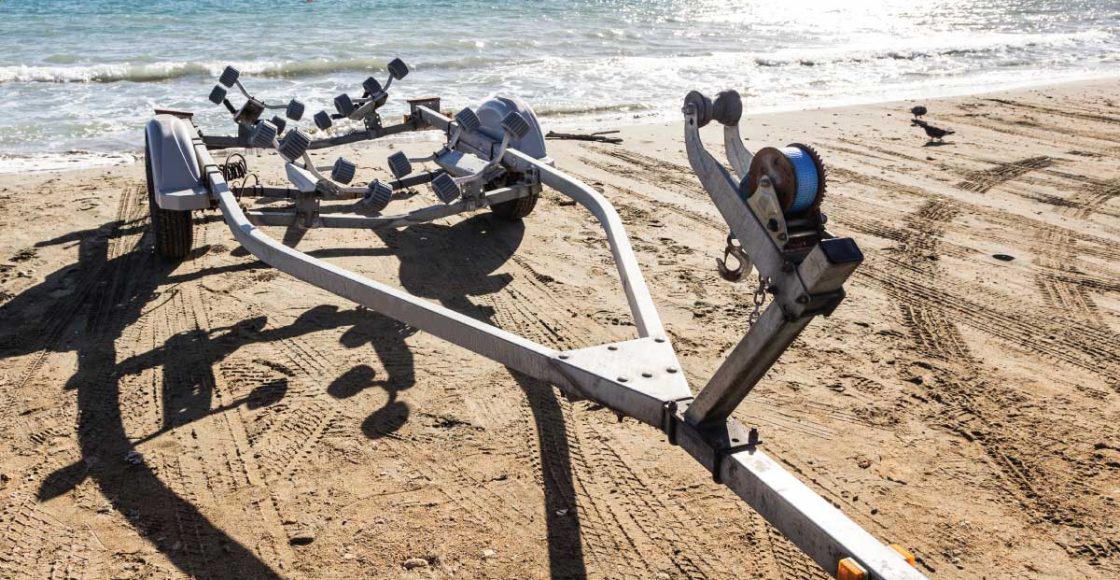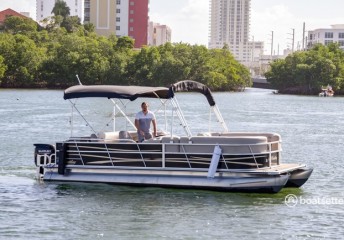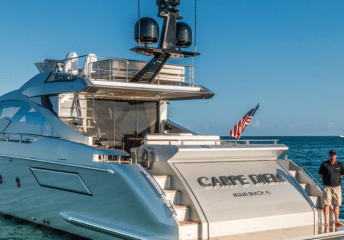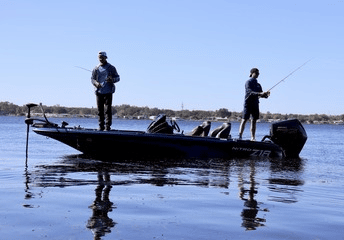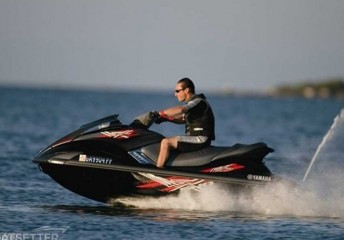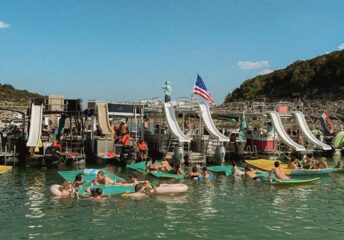Boat Trailer Maintenance Checklist
Last Updated on July 18, 2022 by Boatsetter Team
Boat trailer maintenance is a matter of convenience and safety. A trailer allows you to transport your boating fun and adventure, but trailer trouble on the road to the launch ramp can derail your valuable day on the water. Fortunately, with some essential maintenance, boat owners can avoid the most common issues related to trailers. Use this checklist to prevent common trailer issues.
Follow this essential boat trailer maintenance checklist to get started:
- Always check your trailer lights for a bad ground, bulbs, and a clean connection.
- Inspect your tires—check the age of your tires and their pressure.
- Closely examine your wheel bearings, ensuring the protector is in place.
- Ensure your trailer brakes are in good working condition.
Own a Boat? Bet it’s Empty Right Now. Earn $20K/avg. Renting it Out
1. Check your trailer lights
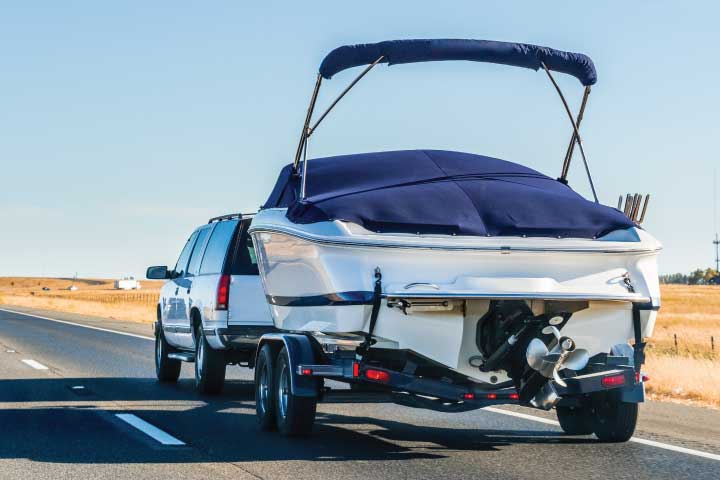
Check your trailer lights every time you hook up the trailer, and double-check them at gas stops or whenever convenient. Your vehicle lights are probably obstructed by the boat, so the trailer lights are essential for safety.
If your lights stop working, here are some solutions:
Bad Ground
A bad ground is the most common cause of trailer light failure. That’s the white wire on your trailer harness. It may be secured to the trailer frame near the hitch with a small screw or bolt. Remove the screw or bolt and use sandpaper to clean any rust off the contact point so the ground is contacting bare metal.
Chafed
The wiring for lights may be routed through the trailer frame. The point where wires enter or exit the frame presents the potential for wear on the insulation if the wiring is not protected with plastic conduit or a rubber grommet on the frame. If the wire chafes through the insulation, it may cause a short. This is most likely to be a problem on older trailers. Inspect the wiring and protect it where it touches the frame.
Bulbs
Most new trailers have LED lights that should never age, but the incandescent bulbs in older trailer lights will burn out which means they’ll need to be replaced. Also, keep in mind that the light sockets are prone to corrosion. You should use a dab of dielectric grease when replacing the bulbs to prevent corrosion.
Clean Connection
Keep the trailer light connection on your vehicle covered when not towing to prevent corrosion on the metal pins, especially if you live where roads are salted in winter. Most will have a plastic cap that fits over the connector. You can get a replacement at an auto parts store. Here’s a helpful tip: applying a little dielectric grease goes a long way in preventing corrosion.
2. Inspect your tires and wheels
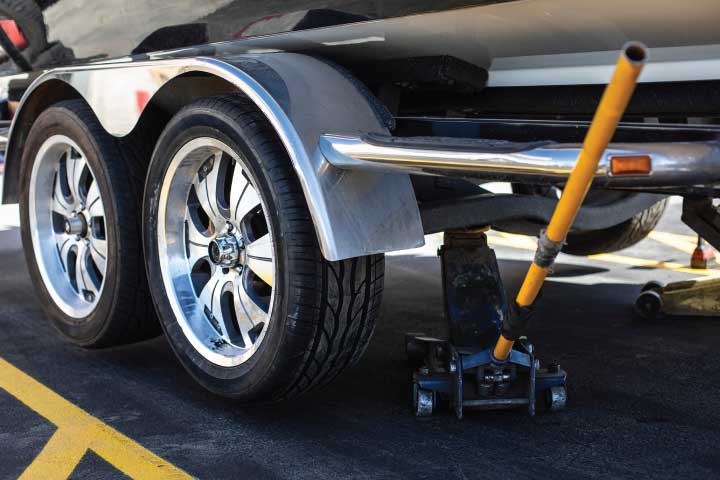
Problems related to tires and wheel bearings can leave you stranded on the side of the road and can even be a safety hazard.
Check Tire Pressure
A failed tire caused by low air pressure is the number-one cause of trailer trouble. Heat builds up in a tire with low pressure and can cause the tire to delaminate and fail, which can be a dangerous situation at 70 mph.
- Check trailer tire air pressure and maintain the maximum rating on the tire or as listed on the capacity sticker on the trailer, which may be 60 psi or more.
- Tires will slowly lose a small amount of air pressure each month, so it’s especially important to check the tires after the trailer has been sitting unused over the off-season.
Don’t Forget the Spare
Not all boat trailers come with a spare tire. If yours did not, get one and a mount for it. It’s good insurance. Remember to maintain the air pressure in the spare, and make sure you travel with tools and a jack you can use to change a flat.
Tire Age
Tires that are more than six years old should be replaced, according to the National Transportation Safety Board.
The last four digits of the DOT code on the tire sidewall indicate the month and year the tire was made; for example “3517” would indicate the tire was made in the 35th week of 2017. The tires under your trailer should all be ST (Special Trailer) type tires, which are designed specifically for trailer use, with stronger chords and stiffer sidewalls than LT (Light Truck) tires.
Wheel Bearings
Failed wheel bearings are another common cause of trailer trouble. A boat trailer should be equipped with wheel bearing protectors (the Bearing Buddy brand is a common term for all bearing protectors) which use a spring-loaded piston to hold grease in the wheel hub under light pressure. This prevents water from entering the hub and corroding the bearing assembly.
The protector will have a grease fitting in its center to add grease and maintain this pressure. Read the directions that come with your trailer for details on adding grease. Even with bearing protectors, it’s a good idea to inspect and repack the wheel bearings with fresh grease every three to five seasons.
3. Check your trailer’s brakes
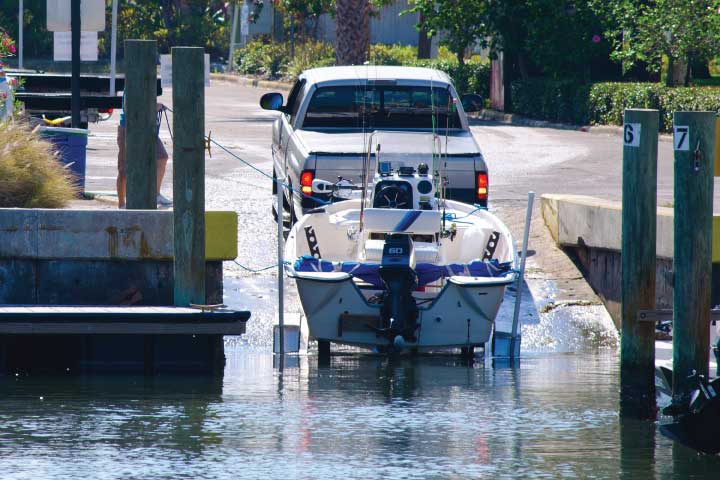
All trailers must have brakes—which will require maintenance over time to ensure safe performance. In some states, all but the lightest boat/trailer combinations will be equipped with brakes. Because a boat trailer is immersed in water when the boat is launched, it is equipped with surge brakes rather than the electric brakes found on RVs and other campers. The boat trailer coupler slides on the frame when you apply your vehicle brakes, using the weight and momentum of the trailer to actuate the brakes.
Trailer Coupler
The surge brake actuator on a boat trailer is part of the coupler assembly (the part that fits over your trailer hitch ball). It may require occasional lubrication to work smoothly. See your owner’s manual for details.
Keep Brakes Clean
If you launch your boat in saltwater, it’s important to rinse the trailer brakes and wheels as soon as possible after you retrieve the boat. This will help prevent corrosion of brake components and wheel lug nuts.
Some marinas will have a fresh-water hose available for this purpose, and some trailers may be equipped with a hose connection and system to rinse the brakes.
Brake Pads or Shoes
Trailer brakes may be disc-type (with brake pads) or drum-type (with shoes), both of which wear with use, just like the brake pads on your tow vehicle. Have the pads or shoes inspected every few seasons by a trailer shop or a general auto repair service.
Brake Fluid
Check the brake fluid reservoir in the master cylinder (on the brake tongue) a couple of times a season, following instructions in the trailer owner’s manual. Fluid level will go down as the pads wear. If the level is suddenly very low you could have a leak in the brake system, which should be repaired immediately.
Boatsetter is proud to help boat owners all over the country maintain and share their vessels! Aside from additional resources for boat owners, we give you all sure opportunities for extra income.
List Your Boat Today to Start Earning.

Charles Plueddeman is a self-employed writer and photographer based in Wisconsin. A staff editor and contributor to Boating Magazine since 1986, he is the author of its “Off My Dock” column. In the marine realm he specializes in engine technology and trailerable boats. His editorial work has appeared in many national publications, including Popular Mechanics, Men’s Journal, Playboy, Popular Science, Cycle World, and Harley-Davidson Enthuisast.
